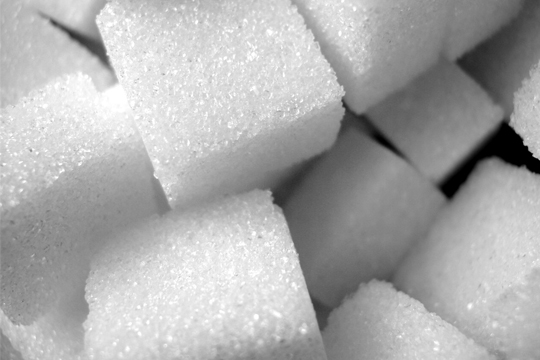
Reducing Food Waste in Foodservice
October 16, 2018 by Doreen Garelick, Dietetic Intern
Our intern Doreen attended a food waste summit for restaurants and compiled these tips to help food service operators redirect…
August 12, 2015

Does Added Sugar deserve a spot on the nutrition facts label? Allison Aaron gives the facts and SPE's take on added sugars.
A lot has been going on with the new FDA labeling laws. One topic on the docket is the issue of sugar. Currently, all of the sugar in a food item is listed together as one number on the Nutrition Facts Label. However, there are two general categories of sugar – natural sugar and added sugar.
Natural sugar is sugar that is innate to food; sugar that is found in the food’s natural state. For example, the sugar in a fresh banana is considered natural sugar. Conversely, added sugar is sugar that does not exist intrinsically in that food. For example, the sugar cooked with banana to create those caramelized bananas for bananas foster would be considered added sugar.
By that logic, bananas foster will have both natural and added sugars – natural sugar from the bananas themselves and added sugar from the sugar crystals used to make the caramel. The same is true for a lot of items we see in the grocery store. Examples include ice cream, granola bars, jam, ketchup, tomato sauce, cereals and even bread. Added sugars not only affect taste, but they also help to extend the shelf life of products.
The decision to include added sugars on the Nutrition Facts Label is a controversial one and it has been getting a lot of attention. As with all issues, it is important to consider the various opinions at hand. Some people believe that there is no need to distinguish between natural and added sugar on the label because the body does not differentiate between natural and added sugars in the body. Sugar is sugar, they say.
However, currently Americans are getting too many of their calories from added sugar, so others believe that listing the added sugar separately on the Nutrition Facts Label will help to reduce added sugar intake. They believe that by labeling the amount of added sugar in a food, people will choose more nutrient dense foods instead of the more energy dense foods that are often full of added sugar.
So what do we think? It is true that foods high in added sugars, such as candy bars, are energy dense and are generally lacking in nutrients. However, we wouldn't frown upon the occasional indulgence. To have a candy bar with added sugar once in a while is okay.
In fact, we are actually more concerned about foods that have hidden added sugars because these are more likely to be foods that people eat regularly. For example, yogurts often have added sugars to make them more palatable to the consumer, and breads often have added sugar to keep them more shelf-stable.
Someone eating a candy bar is likely aware that they are eating something high in added sugar and will therefore (hopefully) keep their intake of those candy bars sporadic. On the other hand, someone eating yogurt for breakfast every morning and a sandwich for lunch every day might be completely oblivious about the added sugar in their yogurt and bread. Those added sugars can accumulate, and without being labeled explicitly on the label, they can go completely unaccounted for. For that person, labeling the added sugar on the Nutrition Facts Label might lead them to make a change that will have a big impact to their daily added sugar intake, and in turn, to their added sugar intake overall.
There's no doubt the debate will continue as the FDA collects feedback from consumers, health experts and industry. What do you think...do you want to see added sugar on the Nutrition Facts Label?

October 16, 2018 by Doreen Garelick, Dietetic Intern
Our intern Doreen attended a food waste summit for restaurants and compiled these tips to help food service operators redirect food waste from landfills.
Nutrition 101

Nutrition 101
September 26, 2018 by Doreen Garelick, Dietetic Intern
Ever notice headlines about rapid weightloss? Dietetic Intern Doreen Garelick looks deeper into a recent eye-catching headline to see if there's any truth behind it.
Connect
 Follow us on Twitter
Follow us on Twitter Friend us on Facebook
Friend us on Facebook Follow us on Pinterest
Follow us on Pinterest Follow us on Instagram
Follow us on Instagram Read our Blog
Read our Blog Watch videos on YouTube
Watch videos on YouTube Watch videos on Vimeo
Watch videos on Vimeo Connect with us on Linkedin
Connect with us on Linkedin Find us on Foursquare
Find us on Foursquare
Tweets by @SPEcertifiedBlog Search
Categories
SPE Certified Newsletter
Sign up for news on the latest SPE-certified venues, events and SPE updates.
We will never share your personal information with a third party.